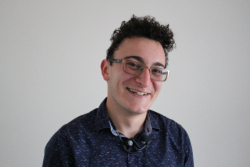Meet Early Career Microbiologist of the Year poster finalist: Padraic Heneghan
Posted on July 1, 2024 by Microbiology Society
This year the Microbiology Society is awarding two Early Career Microbiologist of the Year prizes. The prizes recognise excellence in science communication by a member who is an undergraduate, postgraduate student or within five years of appointment to their first position.
Each of the finalists, who were either speakers or poster presenters, were selected at Annual Conference 2024 to present their research in the poster or speaker final. In the lead up to the poster final, taking place on 9 July 2024 during the Early Career Summer Conference, we speak to poster finalist Padraic Heneghan, from Conway Institute, University College Dublin, Ireland.

What are your current research interests?
My current research interests involve non-universal genetic code and virus-like elements (VLEs) across budding yeast species, the Saccharomycotina. Killer plasmids are VLEs that encode for toxins that target tRNAs of victim yeasts, and we believe that these toxins could select for non-universal genetic codes by selecting for yeasts with novel tRNAs. We believe that killer plasmids’ toxins may have driven a major decoding change in the Saccharomycotina, leading us to conduct a search for more plasmids as well as their toxins. We have validated several of these toxins for their activity in Saccharomyces cerevisiae and plan to investigate their targets.
What inspired you to go into this field of work?
Ever since my final year of my undergraduate, I have been greatly inspired by foundational-level science. Microorganisms and small models like S. cerevisiae and C. elegans have contributed to our understanding of biology, from disease to biotechnology, in an abundance of ways that are massively underappreciated. I feel very honoured to have the opportunity to take part in and contribute to this field.
How would you explain your research to a GCSE student?
When most people think of viruses, they think of diseases like COVID-19 or the Flu. However, there are certain virus-like entities that are beneficial to some species. Like different yeasts, which use them to kill competitors for nutrients. In the same way that humans have interactions with viruses, yeasts also need to adapt to attacks from viruses and virus-like elements. Our goal is to understand what kind of adaptations those virus-like elements can influence.
What does being a part of the Microbiology Society community mean to you?
The Microbiology Society will always be very special to me, as its Annual Conference in Belfast 2022 was the first conference I ever attended. I was a second-year PhD student who did not have any opportunity to interact with the research community outside of my university due to the COVID-19 pandemic. Everyone was so lovely, enthusiastic, and genuinely encouraging. The feeling of camaraderie and support in the society is incomparable.
What do you love most about your job?
Nothing is ever the same! I have learned so much throughout the last four years. I’ve had the opportunity to expand upon my coding and informatics skills, as well as expand my experience in the wet lab. Every day is different, and there’s so much to discover.
You can find and follow Padraic’s work on X (formerly known as Twitter): @TheRealPDogue

